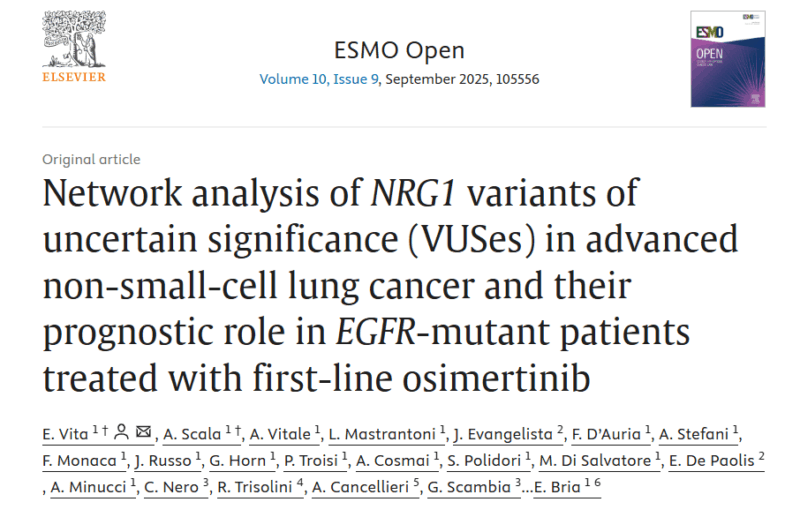Elisa De Paolis, Medical Director at the Agostino Gemelli University Hospital Foundation IRCCS, shared a post on LinkedIn:
“We are proud to see out in ESMO Open journal our recent paper ‘Network analysis of NRG1 variants of uncertain significance (VUSes) in advanced non-small-cell lung cancer and their prognostic role in EGFR-mutant patients treated with first-line osimertinib” from E. Vita et al.
Background:
- NRG1 alterations have recently emerged as oncogenic drivers in multiple solid tumors with zenocutuzumab showing meaningful clinical activity
- NRG1 fusions represent a promising field for target therapy in NSCLC, even if extremely rare (<0.5%) and sometimes co-occur with other known oncogenic drivers.
- A documented oncogenic role could be associated only to the NRG1 fusions, while no clear information is reported about other kinds of alterations.
Aim and Results
- We conducted a retrospective analysis of a large cohort of 878 NSCLC patients enrolled in the FPG500 program
- Among 70 NRG1-mutant NSCLC patients, deletions and SNVs accounted for the vast majority of patients (>90%) and frequently occurred with deregulations of RTK/MAPK and PI3K, TP53 or cell cycle regulatory genes (57.1%).
- Within our co-occurrence network, NRG1 was placed at the intersection of two subnetworks with EGFR—TP53—PIK3CA and KRAS as principal hubs. This organization suggests that the NRG1 modulatory role on the EGFR signaling cascade could happen at receptor-level and downstream transduction pathways.
- In the cohort of EGFR M+(del19/L858R) patients treated with osimertinib, NRG1 results as independent poor prognostic factor: EGFRM+/NRG1wt patients showed significantly longer PFS and OS compared with EGFRM+/NRG1 M+patients.
Our data support the hypothesis that NRG1 VUS are frequently associated with poor prognosis and other oncogene alterations. In EGFR M+ patients treated with osimertinib, concurrent NRG1 alterations were an independent poor prognostic factor.”
Title: Network analysis of NRG1 variants of uncertain significance (VUSes) in advanced non-small-cell lung cancer and their prognostic role in EGFR-mutant patients treated with first-line osimertinib
Authors: E. Vita, A. Scala, A. Vitale, L. Mastrantoni, J. Evangelista, F. D’Auria, A. Stefani, F. Monaca, J. Russo, G. Horn, P. Troisi, A. Cosmai, S. Polidori, M. Di Salvatore, E. De Paolis, A. Minucci, C. Nero, R. Trisolini, A. Cancellieri, G. Scambia, E. Bria
Read The Full Article at ESMO Open.

More Posts Featuring NSCLC.


